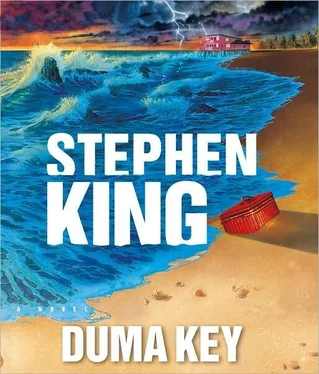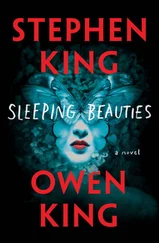“Maybe, but that’s some creepy shit,” Jack said. “I hate it.”
So did I. And it was my studio, goddammit, mine . I had a lease. I snatched the canvas off the easel, momentarily expecting it to burn my fingers. It didn’t. It was just a canvas, after all, one I’d stretched myself. I put it against the wall, facing in. “Is that better?”
“It is, actually,” Jack said, and Wireman nodded. “Edgar… if those little girls were here… can ghosts write on canvas?”
“If they can move Ouija board planchettes and write in window-frost, I imagine they could write on a canvas,” I said. Then, rather reluctantly, I added: “But I don’t see ghosts unlocking my front door. Or putting a canvas up on the easel to begin with.”
“There wasn’t a canvas there?” Wireman asked.
“I’m pretty sure not. The blank ones are all racked in the corner.”
“Who’s the sister?” Jack wanted to know. “Who’s the sister they’re asking about?”
“It must be Elizabeth,” I said. “She was the only sister left.”
“Bullshit,” Wireman said. “If Tessie and Laura were on the ever-popular other side of the veil, they wouldn’t have any problem locating sister Elizabeth; she was right here on Duma Key for over fifty-five years, and Duma was the only place they ever knew.”
“What about the others?” I asked.
“Maria and Hannah both died,” Wireman said. “Hannah in the seventies, in New York — Ossining, I think — and Maria in the early eighties, somewhere out west. Both married, Maria a couple of times. I know that from Chris Shannington, not Miss Eastlake. She sometimes talked about her father, but hardly ever about her sisters. She cut herself off from the rest of her family after she and John came back to Duma in 1951.”
where our sister?
“And Adriana? What about her?”
He shrugged. “ Quién sabe? History ate her up. Shannington thinks she and her new husband probably went back to Atlanta after the search for the babby-uns was called off; they weren’t here for the memorial service.”
“She might have blamed Daddy for what happened,” Jack said.
Wireman nodded. “Or maybe she just couldn’t stand to hang around.”
I remembered Adriana’s pouty I-want-to-be-somewhere-else look in the family portrait and thought Wireman might be onto something there.
“In any case,” Wireman went on, “she has to be dead, too. If she was alive, she’d be almost a hundred. Odds of that are mighty slim.”
where our sister?
Wireman gripped my arm and turned me to face him. His face looked drawn and old. “ Muchacho, if something supernatural killed Miss Eastlake in order to shut her up, maybe we ought to take the hint and get off Duma Key.”
“I think it might be too late for that,” I said.
“Why?”
“Because she’s awake again. Elizabeth said so before she died.”
“Who’s awake?”
“Perse,” I said.
“Who is that?”
“I don’t know,” I said. “But I think we’re supposed to drown her back to sleep.”
The picnic basket had been scarlet when it was new, and had faded only a little over its long life, perhaps because so much of it had been spent tucked away in the attic. I began by hefting one of the handles. The damn thing was pretty heavy, all right; I guessed about twenty pounds. The wicker on the bottom, although tightly woven, had sagged down some. I set it back on the carpet, pushed the thin wooden carry-handles down to either side, and flipped back the lid on hinges that squeaked slightly.
There were colored pencils, most of which had been sharpened down to stubs. And there were drawings made by a certain child prodigy well over eighty years ago. A little girl who’d fallen out of a pony-trap at the age of two and banged her head and awakened with seizures and a magical ability to draw. I knew this even though the drawing on the first page wasn’t a drawing at all — not really, but this: I flicked it up. Beneath was this:
After that, the pictures became pictures, growing in technique and sophistication with a speed that was beyond belief. Unless, that was, you happened to be a guy like Edgar Freemantle, who had done little more than doodle until an accident on a building site had taken his arm, crushed his skull, and nearly ended his life.
She had drawn fields. Palms. The beach. A gigantic black face, round as a basketball, with a smiling red mouth — probably Melda the housekeeper, although this Melda looked like an overgrown child in extreme close-up. Then more animals — raccoons, a turtle, a deer, a bobcat — that were naturally sized, but walking on the Gulf or flying through the air. I found a heron, executed in perfect detail, standing on the balcony railing of the house she had grown up in. Directly below it was another watercolor of the same bird, only this time it was hovering upside-down over the swimming pool. The gimlet eyes staring out of the picture were the same shade as the pool itself. She was doing what I’ve been doing, I thought, and my skin began to creep again. Trying to re-invent the ordinary, make it new by turning it into a dream.
Would Dario, Jimmy, and Alice cream their jeans if they saw these? I thought there was no doubt.
Here were two little girls — Tessie and Laura, surely — with great big pumpkin smiles that deliberately overran the edges of their faces.
Here was a Daddy bigger than the house beside which he stood — had to be the first Heron’s Roost — smoking a cigar the size of a rocket. A smoke-ring circled the moon overhead.
Here were two girls in dark green jumpers on a dirt road with schoolbooks balanced on their heads the way some African native girls balanced their pots: Maria and Hannah, no doubt. Behind them came a line of frogs. In defiance of perspective, the frogs grew larger rather than smaller.
Next came Elizabeth’s Smiling Horses phase. There were a dozen or more. I leafed through them, then turned back to one and tapped it. “This is the one that was in the newspaper article.”
Wireman said, “Go a little deeper. You ain’t seen nuthin yet.”
More horses… more family, rendered in pencil or charcoal or in jolly watercolors, the family members almost always with their hands linked like paperdolls… then a storm, the water in the swimming pool lashed into waves, the fronds of a palm pulled into ragged banners by the wind.
There were well over a hundred pictures in all. She might only have been a child, but she had also been unbottling. Two or three more storm pictures… maybe the Alice that had uncovered Eastlake’s treasure-trove, maybe just a big thunderstorm, it was impossible to say for sure… then the Gulf… the Gulf again, this time with flying fish the size of dolphins… the Gulf with pelicans that appeared to have rainbows in their mouths… the Gulf at sunset… and…
I stopped, my breath caught in my throat.
Compared with many of the others I’d gone through, this one was dead simple, just the silhouette of a ship against the dying light, caught at the tipping-point between day and dark, but its simplicity was what gave it its power. Certainly I’d thought so when I drew the same thing on my first night in Big Pink. Here was the same cable, stretched taut between the bow and what might in Elizabeth’s time have been called a Marconi tower, creating a brilliant orange triangle. Here was the same upward shading of light, orange to blue. There was even the same scribbly, not-quite-careless overlay of color that made the ship — skinnier than mine had been — look like a phantom out there, trudging its way north.
“I drew this,” I said faintly.
Читать дальше










